In their study, “Universal values, foreign money,” Ron and Pandya find that most human rights groups in selected parts of India, Mexico and Morocco rely heavily on foreign funds. The authors then raise provocative questions about why this is so. Poverty? Fear of government retribution? Lack of public trust in human rights groups themselves?
Their findings inspired me to investigate the same questions in my own country, Turkey. I quickly discovered that there are almost no studies of nonprofit funding in Turkey, and that is especially true for Turkey’s human rights organizations. So this essay is limited to what little I could learn about the largest domestic rights groups in the country.
First, a little history
In 2005, a group of activists created a national umbrella organization for Turkish human rights organizations, the Human Rights Joint Platform (İnsan Hakları Ortak Platformu - İHOP). Its founding members were the Human Rights Association (IHD, 1986), Human Rights Foundation of Turkey (Türkiye İnsan Hakları Vakfı - TİHV, 1990), Organization of Human Rights and Solidarity for Oppressed People (İnsan Hakları ve Mazlumlar Derneği - Mazlumder, 1991), Helsinki Citizens’ Assembly (Helsinki Yurttaşlar Derneği_- HYD, 1993), Amnesty International - Turkey (Uluslararsı Af Örgütü - UAÖ, 1995), and the Human Rights Research Association (İnsan Hakları Araştırmaları Derneği- İHAD, 2006). Although the Human Rights Foundation and Mazlumder later abstained from formal membership, they still participate in some IHOP activities.
The Human Rights Association was established after the military coup of 1980 by the families of coup victims and Turkish and Kurdish intellectuals. İHD, was broadly leftist in its early years; later, when the war between the state and the Workers Party of Kurdistan (PKK) intensified, it took on a stronger Kurdish focus. İHD now has branches all over Turkey, and is generally recognized as one of the strongest human rights NGOs in the country.
Mazlumder had similar origins – intellectuals and victims of the military coup – although its leanings are Islamist rather than leftist.
The Human Rights Foundation is more specialized, as it works on the treatment and rehabilitation of torture victims. It was created by members of İHD, as well as doctors, activists and intellectuals, and publishes annual reports on human rights violations in Turkey.
The Helsinki Citizens’ Assembly was also founded by intellectuals from different walks of life and different political affiliations, and functioned from the outset as the Turkish branch of the international Helsinki Citizens’ Assembly. The Assembly focuses on fundamental rights and freedoms, peace, democracy and pluralism.
The Human Rights Research Association was created by jurists, academics and human rights activists, and focuses on promoting human rights values through research, monitoring, reporting and training.
With the exception of Amnesty International-Turkey, none of these organizations publish information on their budgets or funding sources on the web.
Grass-roots groups, local money
Three of these groups – the İHD, Mazlumder and UAÖ-Turkey, are grass-roots organizations in that they are locally organized; have regular, dues-paying members all over Turkey, and rely heavily on volunteers. Of these three, only Amnesty-Turkey, as the national branch of an international organization, receives financial support from abroad, mainly from Amnesty headquarters in London. Amnesty-Turkey also raises local funds through membership fees and campaigns.
İHD and Mazlumder have the strongest organizational structures in the country. The Association’s headquarters is in Ankara, but the group has 39 branches all across Turkey. Mazlumder’s headquarters also are in the capital, and its 26 local branches are similarly scattered across the country. Both have thousands of members, and depend almost entirely on funding from Turkish citizens. İHD receives small sums from abroad for specific projects, but like Mazlumder depends heavily on membership fees and other local donations.
Turkey’s two strongest grass-roots rights groups, in other words, are domestically rather than internationally funded. Since both address a wide range of human rights problems, their budgets are not small. Given their scope and ambitions, however, these groups are constantly strapped for cash.
Despite their reliance on local funding, Turkish government sources, social conservatives and political nationalists often attack these grass-roots groups for being “politically biased.”
Advocacy groups, foreign money
Most of the other human rights groups in Turkey are not grass-roots NGOs, with few dues-paying members and no branches elsewhere in the country. Except for TİHV, which has representatives and treatment centers in five provinces.
Without a dues-paying membership base, these professional advocacy groups must look to other sources of funds. They find few sources within Turkey, so they necessarily turn to foreign sources.
Groups such as the HYD and the İHD are “project-based,” meaning that they submit individual project proposals to funders, and depend almost entirely on the success of those proposals for organizational survival. Other professional advocacy groups (which focus chiefly on research, advocacy and education) work on more focused human rights issues, such as women and children, the LGBT community, or the environment. These groups also rely heavily on foreign money.
Project-based and issues-focused professional advocacy groups depend on non-Turkish sources for more than 90% of their needs.
Much of this funding comes from the European Union. The EU Delegation to Turkey, for example, has an annual budget of some €1.75 million for NGOs, while other EU funding is available through the European Commission’s Civil Society Facility.
Other European sources include the German Heinrich Boll Foundation, Friedrich Ebert Foundation, Friedrich Naumann Foundation and DVV International Institute für Internationale Zusammenarbeit des Deutchen Volkshochschul Verbandes, the Netherlands’ state-sponsored and administered Matra Program, the Swedish bilateral funding agency SIDA, Britain’s Global Dialogue program, and a few private American foundations including the Open Society, OAK, Mott, and Chrest foundations.
Does poverty play a role?
Why do professional advocacy groups find it so hard to raise funds within Turkey? Is it because the country is too poor?
Income distribution may play a role, but it’s hard to make a strong case for sheer economics. Turkey’s economy, after all, is the world’s 17th largest according to 2012 figures. Its PPP-adjusted per capita income was $18,190 in the year 2012, placing it in the upper third of countries globally. Although the country’s income is not evenly distributed, Turkey is not “poor.”
In fact, some Turkish businesses and banks do donate funds to civil society, including Garanti Bank, which sponsors World Wild Fund for Nature; Akbank, which sponsors the Make a Wish Foundation, and Procter & Gamble, which sponsors the Small Steps, Big Tomorrows education project.
Donations to NGOs doing human rights work, by contrast, are still rare.
In 2012, the Charity Aid Foundation, relying on Gallup polls, reported that 10% of surveyed Turkish citizens said they had given money to a charitable organization in the past month, 4% had helped a stranger, and 31% had volunteered their time. These numbers are not huge; in fact, Turkey ranks towards the bottom of the Foundation’s World Giving Index. Still, Turkey does have a culture of charitable giving, just like any other country. Until now, however, that culture has not included donating to human rights NGOs.
The challenge of nationalism
Government policy and Turkish nationalism are chief among the reasons for not giving money to local rights groups.
Since 1980, successive Turkish governments have favored neoliberal economic policies of privatization and deregulation, opening the country to inflows of foreign capital. When it comes to civil society, however, officials have remained wedded to the pre-liberalization xenophobia, claiming that foreign funding for local NGOs, unlike foreign economic investment, is a bad thing.
The government often attacks Turkish human rights groups for doing the work of “foreign powers,” plotting against Turkey, or supporting “separatist ideologies,” such as Kurdish nationalism.
Criticism of this sort scares off potential domestic donors. As a result, NGOs without a grass-roots base and working on Turkey’s most sensitive political issues – including the Kurdish question, ethnic identity, torture, disappearances, and religious freedoms – are obliged to turn to foreigners for money.
When they do so, however, officials, nationalist politicians and media columnists attack them for relying on foreign support. The state Anatolian news agency claimed that “The Greeks are paying IHD.”
Taking foreign money makes Turkish human rights groups vulnerable to attack from all quarters. The Kemalists (secular modernists) dislike rights NGOs for criticizing the state and appealing to non-Turkish funding sources. Turkish leftists, by contrast, welcome attacks on the state but oppose rights NGOs for using “imperialist money.” Turkish Islamists, for their part, suspect the NGOs are up to no good when they receive money from western sources.
Each opposes foreign funding to Turkish NGOs for their own reasons, putting local rights groups in a squeeze.
These suspicions of foreign-linked Turkish citizens can be preposterous. Recall, for example, the nationalist campaign against the acclaimed Turkish author, Orhan Pamuk, who won the 2006 Nobel Prize for Literature. In Turkey, some nationalists accused Pamuk of treason for saying that Turkey bore responsibility for the murder of Armenians at the end of the Ottoman period and for killing Kurds during the 1980s. Some Kemalist intellectuals went so far as to sign a petition against his being awarded the Nobel Prize.

Orhan Pamuk. Wikimedia/Public domain.
Funding may also be hard because some activists and survivors of abuse believe human rights work should be voluntary rather than paid.
Some rights groups, moreover, may refuse on principle to accept money from the Turkish state or the private sector (the abusers), believing that to do so would discredit their work and cost them their independence. Although principled, these attitudes undercut the potential for local fund-raising, human rights professionalism, and domestic NGO sustainability.
Attacked from all quarters
Grass-roots groups raise most of their funds within Turkey, from members and supporters. Still, critics attack them for being politically biased. Professional advocacy groups have no choice but to raise money from abroad, but then are similarly attacked, by the same critics, for receiving outside funding.
Until these public attitudes change, it will be hard to develop a sustainable, domestically supported human rights sector.
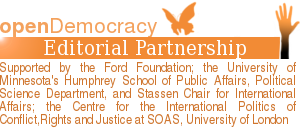
Read more
Get our weekly email
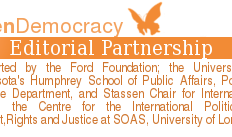
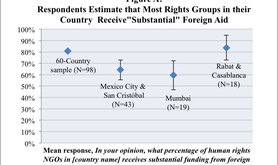
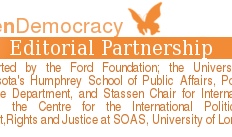
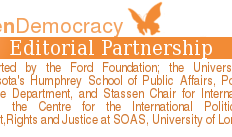
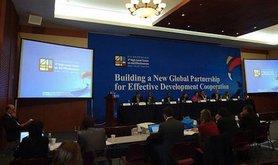

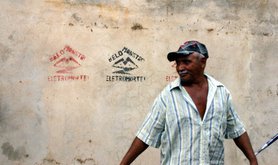
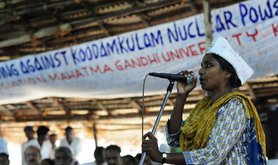
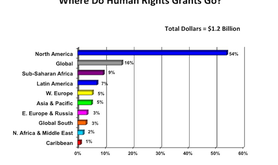


Comments
We encourage anyone to comment, please consult the oD commenting guidelines if you have any questions.